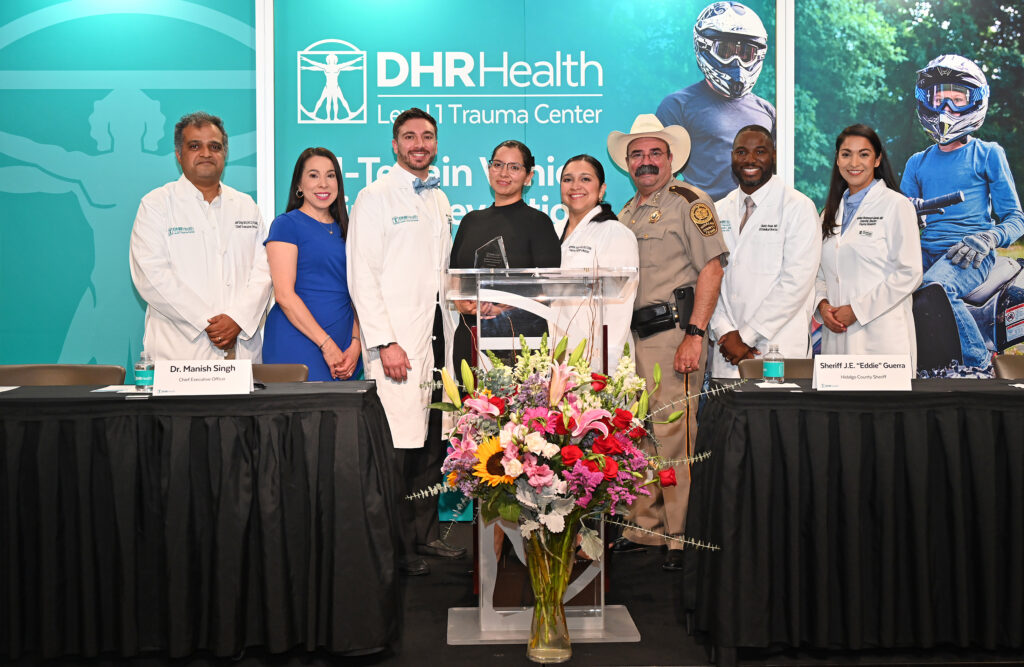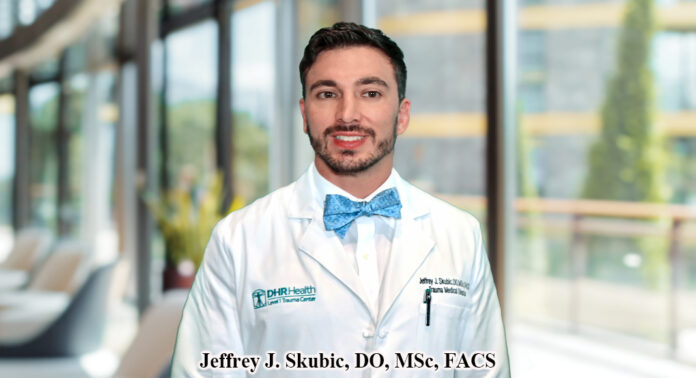The Passion Behind the Precision
Mega Doctor News
By Roberto Hugo González
In the high-stakes world of trauma care, where every second can mean the difference between life and death, Dr. Jeffrey Skubic stands out not just for his commitment to saving lives but also for his visionary approach to injury prevention and education. As the Trauma Medical Director at DHR Health, Dr. Skubic has been a formidable presence since 2018, assuming the director role in 2020. His passion for operating in extreme conditions and emergencies is not just a professional calling but a daily race against time to make a difference in the lives of those he serves.
During a special interview with Mega Doctor News, Dr. Skubic shared insights into his groundbreaking work and the latest initiatives under his leadership to reduce preventable injuries within the community.
When asked about his DHR Health tenure, Dr. Skubic said, “I have been working here since 2018 and as Trauma Medical Director since 2020.” His journey into trauma care is marked by a relentless pursuit of excellence and innovation in medical practice. Dr. Skubic’s academic and professional trajectory is nothing short of impressive. “I’m a general surgeon; I also did fellowships in trauma surgery, and acute care surgery, and surgical critical care,” he noted, highlighting that he is double board-certified in surgical critical care and general surgery by the American Board of Surgery.
Championing ATV Injury Prevention

On this particular day, Dr. Skubic and his team had gathered the press to unveil a new initiative close to their hearts—the ATV Injury Prevention Program. The decision to launch this program did not come lightly; it was the result of observing a disturbing trend of patients with severe injuries arriving at the hospital. “We kept noticing severe after severe injury coming into the hospital regularly, and many of these are preventable with proper safety procedures,” Dr. Skubic emphasized. The initiative aims to spread awareness and educate the community on the importance of safety measures to mitigate such devastating incidents.
Dr. Skubic’s commitment to advancing trauma care extends beyond the immediate life-saving procedures at the hospital. He is an associate professor of surgery at the University of Houston and plays a vital role in shaping the future of trauma care through education. “I’m also the Program Director for the Surgical Critical Care Fellowship, which we started in 2023. It’s the first ever in South Texas,” he stated proudly. This program is a significant milestone for the region, aimed at training the next generation of trauma surgeons to be double board-certified, thereby enhancing the quality and availability of critical care.
Dr. Skubic’s vision for the future is clear: to populate the region with highly skilled, double board-certified trauma surgeons. His efforts are not just about addressing the immediate needs of trauma care but also about building a sustainable, well-trained workforce capable of handling the complexities of trauma surgery. Through DHR Health and his leadership initiatives like the ATV Injury Prevention Program, Dr. Skubic is saving lives and fundamentally transforming the landscape of trauma care in the region.
Dr. Skubic discussed with Mega Doctor News the driving forces behind his decision to specialize in trauma surgery, a field where precision meets unpredictability, and the stakes could not be higher. The field of trauma surgery is far from the ordinary; it’s a territory where life and death decisions are made in the blink of an eye.
When asked what attracted him to such a high-pressure specialty, Dr. Skubic’s response illuminated the basic motivation and passion that guided his career. “The surgical cases that I got most excited about were any kind of emergency or disaster or a bad traumatic injury,” Dr. Skubic shared. The unpredictability and immediate impact of his actions on patients’ lives drew him in. Unlike elective surgeries, where meticulous planning can precede the procedure, trauma surgery demands spontaneity, adaptability, and unparalleled expertise.
Dr. Skubic’s description of his work environment highlights the exhilarating pace and variety of challenges that characterize the field of trauma surgery. “When I’m on call, one minute I could be taking out an appendix, and the next minute I could be doing open heart surgery,” he explained. This unpredictability requires an extensive skill set and the mental agility to switch gears immediately.
Interestingly, Dr. Skubic equates the trauma surgery experience with an act of discovery. Due to the critical nature of many cases, more time is needed to perform comprehensive diagnostics like CT scans. Surgeons sometimes need to learn the full extent of the injuries they must address. “It’s discovering it, finding it, and then coming up with a plan to fix it,” Dr. Skubic elaborated on the process. While daunting to some, this aspect of his job is exhilarating for him—proof of his passion for the field.
Dr. Skubic also shared insights into the complexities of trauma surgery. From open-heart surgeries performed by a general trauma surgeon to reconstructing major blood vessels, the challenges are immense. He recalled a particularly intricate case involving a gunshot wound to the femoral vein, which required the construction of an interposition graft. “Being able to do complex vascular surgery, at a moment’s notice in the middle of the night, those are some of the most challenging procedures,” he remarked.
We uncovered the diverse experiences that have shaped his approach and philosophy toward medicine. From the busy streets of New York to the challenging environments of Central America and beyond, Dr. Skubic’s journey shows his dedication and adaptability, ultimately leading him to make a significant impact in the Rio Grande Valley.
Born in Essex County, New Jersey, and raised near the vibrant city of New York, Dr. Skubic’s early life was immersed in the diversity and dynamism that characterizes the region. His medical journey took him from the East Coast to the University of Arizona for residency, then back to Boston for fellowship training. However, his volunteer work across various global entities, including Central and South America, Alaska, and New Zealand, profoundly expanded his medical horizons.
“For me, that allowed me to acquire an extensive way of doing things and learn the best techniques I could from everywhere,” Dr. Skubic explained. This global perspective enabled him to innovate and adapt in surgeries, often with limited technology and resources, improving his ability to think critically and creatively.
Dr. Skubic’s path to the Rio Grande Valley, a region unknown to him before his arrival, was influenced by his experiences in Panama City, where he worked in the country’s main trauma center. This experience provided invaluable training grounds that prepared him for the challenges and opportunities he would face in Texas. Upon arriving in the Valley, Dr. Skubic was drawn to DHR Health’s eagerness for growth and change. There was potential to profoundly impact the Region by establishing a Level I trauma center and advancing medical care.

DHR Health’s vision extended beyond providing immediate trauma care and recognized the importance of developing a sustainable medical education system within the Valley. The introduction of a fellowship program marks a significant milestone in the region’s medical education landscape since the inception of a residency program in 2016, which has already seen several graduating classes.
Dr. Skubic emphasized the strategic advantage of training medical professionals locally: “Because people are very likely to stay and practice where they train; if we can keep them here and train them here, they’re more likely to stay.”
Through his leadership, Dr. Skubic is addressing the immediate needs of trauma care and laying the groundwork for a robust healthcare system in the Rio Grande Valley. His efforts, to train the next generation of surgeons within the community, promise to enhance the quality of care and ensure a lasting impact on the region’s healthcare landscape.
In the final phase of our conversation about Dr. Skubic’s impactful work as the Trauma Medical Director at DHR Health, we dig into the innovative approaches and partnership efforts shaping the future of trauma care along the US-Mexico border. Dr. Skubic’s initiatives highlight a commitment to immediate patient care and long-term improvements in trauma research, prevention, and system-wide coordination.
BRDR-T, A Revolutionary Consortium
One of the most significant achievements under DHR Health, Dr. Skubic, and a large team of professional leadership, is the creation of BRDR-T Consortium Trauma Centers, a pioneering border research consortium. This network spans from Brownsville, Texas, to University of California San Diego, uniting high-level trauma centers across the US-Mexico border to study and address the unique challenges of trauma care in this region.
“We have created a consortium that studies the injuries that occur on the US-Mexico border,” Dr. Skubic stated, stressing the partnership’s effort to understand and improve trauma care. BRDR-T’s establishment has already borne fruit, with its first publication appearing in the Journal of Trauma in 2023 titled “Understanding the burden of traumatic injuries at the United States–Mexico border: A scoping review of the literature.”
This milestone marks the beginning of what promises to be a robust body of research aimed at tackling the shared challenges faced by trauma centers along the border. By pooling resources and data, BRDR-T is positioned to make significant contributions to the field of trauma care, offering insights that could lead to better outcomes for patients across the region.
When discussing the needs and future directions of trauma care in the Rio Grande Valley and beyond, Dr. Skubic highlighted the critical issue of access, especially in the more remote areas. The recent loss of helicopter service in South Texas for emergency medical transport has left a gap in rapid response capabilities, underlining the importance of enhancing ground EMS services and exploring innovative solutions like regional whole blood programs. According to Dr. Skubic, these initiatives are crucial for improving survival rates in critical cases where time is of the essence.
Dr. Skubic also took a moment to emphasize the importance of injury prevention, particularly concerning all-terrain vehicle (ATV) use. This concern led DHR Health to launch the ATV Injury Prevention Program. His advice is straightforward yet vital: avoid operating ATVs while intoxicated, use appropriately sized ATVs, and always wear a helmet. These simple measures can significantly reduce the risk of severe injury.
Dr. Skubic’s extraordinary journey in trauma care makes it clear that his influence extends far beyond the operating room. Through initiatives like the BRDR-T Consortium Trauma Center and the ATV Injury Prevention Program, DHR Health and Dr. Skubic are saving lives and transforming the landscape of trauma care and injury prevention.
Their efforts reflect a deep commitment not only to medical and surgical excellence, but also to innovation in medical education and research. By addressing the unique challenges of trauma care at the U.S.-Mexico border, the work of Dr. Skubic and his collaborators promises to improve care practices, develop more effective policies, and ultimately save more lives.
This dedication to whole-patient care, from prevention and education to treatment and recovery, underscores the importance of a holistic view in medicine. DHR Health, Dr. Skubic, and all the professionals who share this vision, with their focus on training the next generation of medical professionals and their leadership in trauma research, are making a difference not only in their community, but also in the medical field globally.
In summary, Dr. Jeffrey Skubic’s career is that of a passionate and dedicated practitioner who is making a huge impact on trauma medicine. Through innovation, leadership, and a relentless commitment to continuous improvement, he is setting new standards in trauma care, teaching, and research, ensuring that his legacy will benefit patients and medical professionals for years to come.











